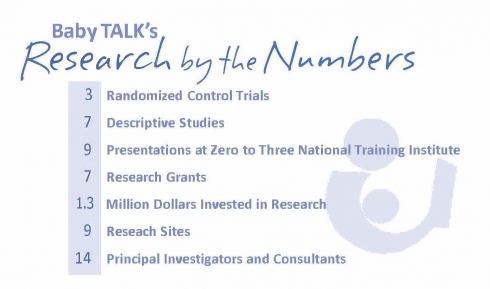Research
Evidence-based practice: The Baby TALK model in action.

Since 1991, Baby TALK has been conducting research as to the impact of programs. In a study that spanned 8 years, Baby TALK was able to measure a statistical difference in incoming kindergartner’s test scores in Decatur Public Schools if they had been served by Baby TALK during their earliest years. The results of several other qualitative studies through the years have provided encouragement that Baby TALK seems to positively impact families in a variety of ways.
Beginning in 2010, Baby TALK integrated research projects to study the efficacy and effectiveness of its model components including studies examining the home visiting model, the Baby TALK Newborn Encounter, model fidelity processes, and professional development protocols. We seek to understand the impact of the Baby TALK model on cognitive, language, and social development among infants and young children, parent competence, parental stress levels, community engagement, the parent-child relationships, and our Baby TALK professionals. We also hope to inform other providers and stake holders of best practices in home visiting and community engagement in support of high-risk, vulnerable families with young children starting at birth.
Rigor in Baby TALK’s research efforts has led to three Randomized Control Trials being conducted at this time, with scheduled completion in February 2018. The RCTS are measuring the impact of Baby TALK Home Visiting programs as well as the impact of Baby TALK Newborn Encounter Universal Screening.